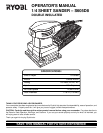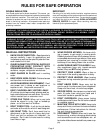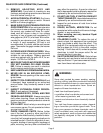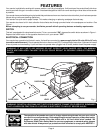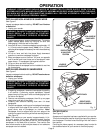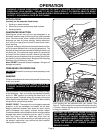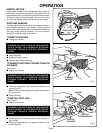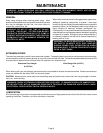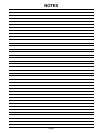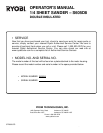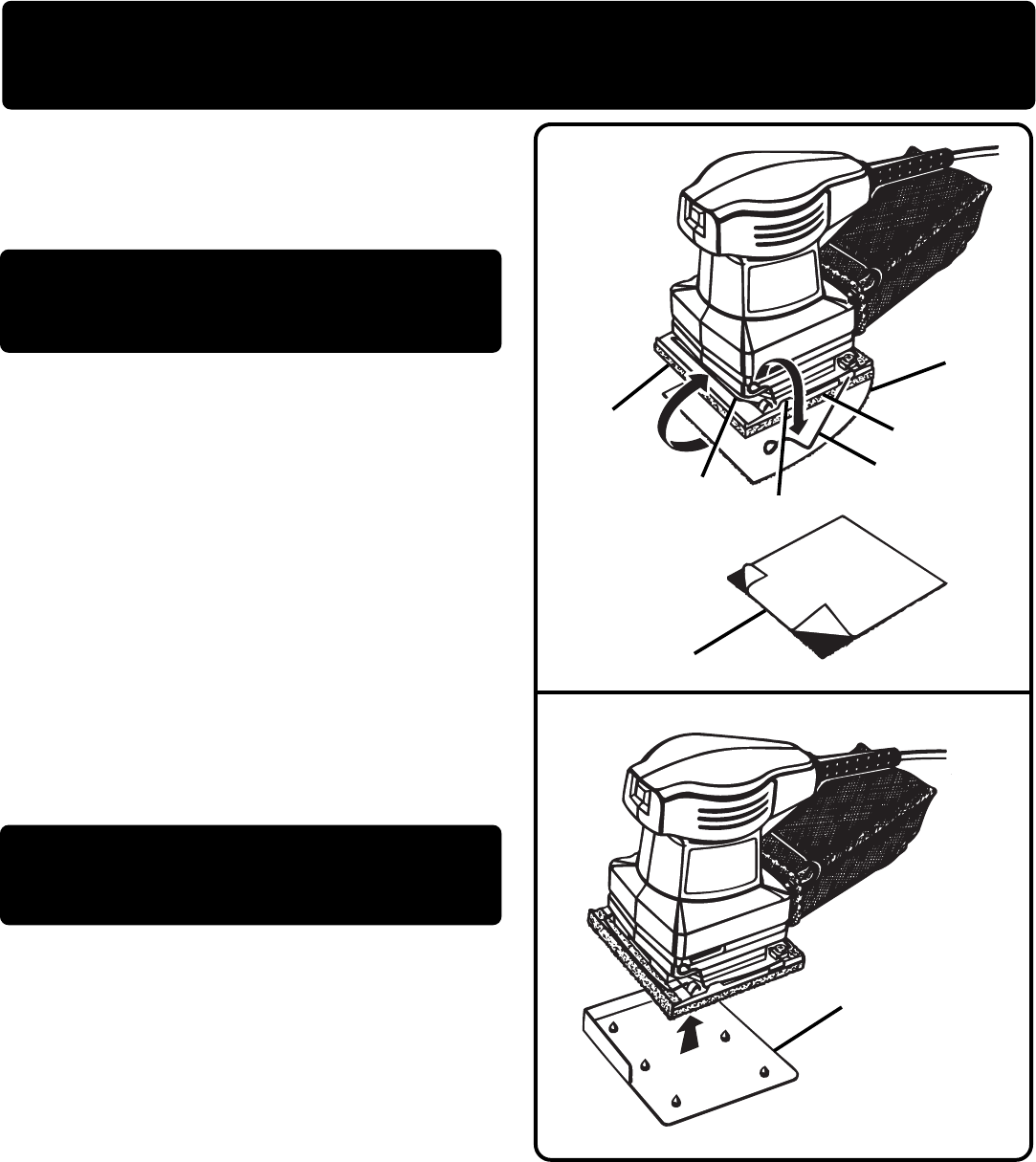
Page 5
OPERATION
WARNING: YOUR SANDER SHOULD NEVER BE CONNECTED TO POWER SUPPLY WHEN YOU ARE
ASSEMBLING PARTS, MAKING ADJUSTMENTS, ASSEMBLING OR REPLACING SANDPAPER, CLEANING,
OR WHEN NOT IN USE. DISCONNECTING SANDER WILL PREVENT ACCIDENTAL STARTING THAT
COULD CAUSE SERIOUS PERSONAL INJURY.
INSTALLING NON-ADHESIVE SANDPAPER
See Figure 2.
Inspect sandpaper before installing. DO NOT use if broken
or defective.
1. Unplug your sander.
WARNING: FAILURE TO UNPLUG YOUR SANDER
COULD RESULT IN ACCIDENTAL STARTING
CAUSING POSSIBLE SERIOUS PERSONAL
INJURY.
2. If replacing sandpaper, remove old sandpaper. To remove
paper, release paper clamp by lifting up on lever and
disengaging it from the tab on the platen.
3. Insert end of new 1/4 sheet sandpaper approximately 1/2
in. (13 mm) under the paper clamp. Note: 1/2 in. (13 mm)
clamping of sandpaper is necessary for multi-sheet stacking
of paper.
4. Lift up on lever and lock into place. Apply downward
pressure to conform sandpaper to platen.
5. Wrap sandpaper around cushion. Lift lever on opposite
end of sander and insert loose end of sandpaper under
paper clamp. Fit sandpaper tight against cushion.
6. Lift up on lever and lock into place.
7. Multiple sheets of sandpaper can be installed at one time
for convenience.
INSTALLING ADHESIVE SANDPAPER
See Figure 2.
Inspect sandpaper before installing. DO NOT use broken or
defective sandpaper.
1. Unplug your sander.
WARNING: FAILURE TO UNPLUG YOUR SANDER
COULD RESULT IN ACCIDENTAL STARTING
CAUSING POSSIBLE SERIOUS PERSONAL
INJURY.
2. If replacing sandpaper, remove old sandpaper by peeling
it off cushion. If removing regular sandpaper, release
paper clamp by lifting up on lever and disengaging it from
the tab on the platen.
3. Remove non-adhesive sandpaper, then lift up on paper
clamp lever and lock it into place.
4. Carefully peel adhesive backing from new 1/4 sheet
sandpaper.
5. Position sandpaper, making sure front edge of sandpaper
is aligned with front edge of the cushion, then carefully
press sticky side of sandpaper on cushion. Note:
Sandpaper must be aligned with the front edge of the
cushion for proper functioning of the flush sanding feature.
See Figure 2.
Note: The cushion on your sander is approximately 1/4 in.
(6.4 mm) smaller than precut adhesive backed sanding
sheets. If desired you may want to trim off the overhang of
sandpaper on the back side of cushion. The cushion has
been made smaller so that multiple sheets of non-adhesive
sandpaper can be installed.
PAPER PUNCH
See Figure 3.
A paper punch template has been supplied with your sander.
This punch should be used for aligning and punching holes in
the sandpaper. Punched holes must align with the holes in
the cushion.
Punching the holes properly is a necessary step in order for
the dustless feature of your sander to function properly.
Fig. 3
Fig. 2
TAB
CUSHION
PLATEN
PAPER CLAMP
ADHESIVE
SANDPAPER
PAPER CLAMP
IN UNLOCKED
POSITION
NON-ADHESIVE
SANDPAPER
ORIENT PAPER
PUNCH AS SHOWN
PAPER PUNCH



